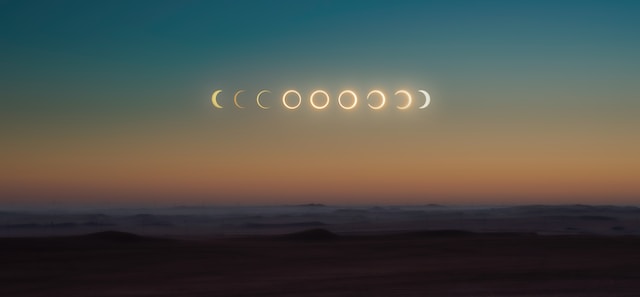It’s almost eclipse season! The continental United States will experience two eclipse events in the next year: an annular eclipse on October 14, 2023, and a total solar eclipse on April 8, 2024.
Northern Wisconsin is not in the path of totality for either event, but we will see the annular eclipse in October for about 2 ½ hours with about 39% coverage of the sun at maximum, and the total eclipse in April for about 2 ½ hours with about 77% coverage of the sun at maximum. The effects will definitely be visible here in the Northwoods, but you’ll need eclipse glasses or another safe method to view it.
If you plan to offer programming and eclipse glasses, plan ahead: The last time a total eclipse was visible in the U.S. in 2017, it was quite the craze at libraries for all patrons, not just kids! TimeandDate.com has more information about the eclipse schedules.
If you want to learn more about planning STEM programming about the eclipse, NWLS Director Sherry Machones recently shared information about a Solar Science Workshop with Star Net and NASA@Your Library at the Duluth Public Library on May 4th at 10am to 4pm. Register here.
Solar Science Workshop with Star Net and NASA @ Your Library
Thursday, May 4th, 10am-4pm
Duluth Public Library
Register here for Solar Science Workshop: https://forms.office.com/g/gGY8rMMiMs
In-person Solar Science workshops will prepare and empower public library staff to facilitate meaningful solar and space science programs for their patrons that build curiosity, knowledge and inspiration. Attendees will receive hands-on training on operating solar telescopes and other methods for direct and indirect solar viewing, best practices for developing and facilitating STEM programs, and how to engage with community partners and library-specific digital resource networks.
The goals of these solar science workshops are to help library staff:
- Build off the excitement of the 2023 and 2024 solar eclipses, and engage their patrons in solar science activities
- Safely and effectively facilitate direct (e.g. solar telescope and Sunoculars) and indirect methods of safe solar viewing
- Develop and facilitate exciting and interactive STEM programming at their library
Almost every solar science workshop will include the following elements:
- Advice on engaging with community partners to promote and support solar science programs
- Ample opportunities for peer-to-peer networking and group discussions
- “Guide on the Side” facilitation strategies for STEM learning
- Hands-on facilitation of interactive solar science programs designed for library settings
- Advice on leveraging NASA volunteer networks like the Night Sky Network and Solar System Ambassadors


Recent Comments